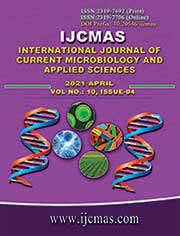


 National Academy of Agricultural Sciences (NAAS)
National Academy of Agricultural Sciences (NAAS)

|
PRINT ISSN : 2319-7692
Online ISSN : 2319-7706 Issues : 12 per year Publisher : Excellent Publishers Email : editorijcmas@gmail.com / submit@ijcmas.com Editor-in-chief: Dr.M.Prakash Index Copernicus ICV 2018: 95.39 NAAS RATING 2020: 5.38 |
Pesticides coupled with other modern inputs undoubtedly have enabled the country to achieve unparalleled increase in agricultural productivity over the last five decades and thus enabled to achieve food security. The term pesticide covers a wide range of compounds including insecticides, fungicides, herbicides, rodenticides, molluscicides, nematicides, plant growth regulators and others. In the present era, the agrochemicals used in agriculture are produced from fossil fuel, and are not renewable and diminishing in availability. Looking to all these aspects, the present study was conducted in Nambol Block of Bishnupur district of Manipur with total respondents of 100 vegetable growers selected from five villages which are selected through simple random sampling procedure during the year 2019-20. An ex-post-facto research design was adopted for this study. The four objectives of the current research were to study the socio-personal, socio-economic and psychological characteristics of vegetable growers, to measure the extent of adoption of organic and inorganic pesticides by the vegetable growers, to find out the relationship between selected independent variables and dependent variable and to identify the problems faced by the vegetable growers. The data was collected through personal interview method. The statistical tools: mean, frequency, standard deviation, percentage, correlation coefficient, and regression analysis were used for interpretation and analysis of the data collected from the respondents. The data collected from 50 respondents of organic pesticides adopters revealed that the majority (48.00%) of the vegetable growers had 'medium' extent of adoption of organic pesticides followed by 'high' (26.00%) and 'low' (26.00%). whereas data collected from 50 respondents of Inorganic pesticides adopters revealed that the majority (38.00%) of the vegetable growers had 'high' extent of adoption of Inorganic pesticides followed by 'low' (36.00%) and 'medium' (26.00%). The eight variables i.e., (Education, Farming experience, Farm size, Annual income, Input availability, Training undergone, Mass media exposure and Risk-taking ability) and eight variables i.e., (Age, Farming experience, Annual income, Input availability, Extension contact, Training undergone, Mass media exposure and Market accessibility) were found to be positively and significantly related to the extent of adoption of organic and inorganic pesticides respectively at 0.01 and 0.05 level of probability. The regression analysis revealed that six variables (Education, Farming experience, Farm size, Annual income, Training undergone and Mass media exposure) and four variables (Input availability, Extension contact, Training undergone and Risk-taking ability) contributed significantly to the prediction on extent of adoption of organic and Inorganic pesticides among vegetable growers respectively. A resilient and healthy finding of the study was that all the twelve independent variables jointly contributed (82.70%) and (72.30%) towards the variations in the extent of adoption of organic and Inorganic pesticides among vegetable growers respectively. The F-values being 14.776 and 8.040 were also found significant at 0.01 level of probability for organic and inorganic pesticides adopting vegetable growers respectively. which indicated the significant effect of the independent variables in predicting the extent of adoption of organic and inorganic pesticides among vegetable growers when all the independent variables were functioning jointly.
 |
 |
 |
 |
 |